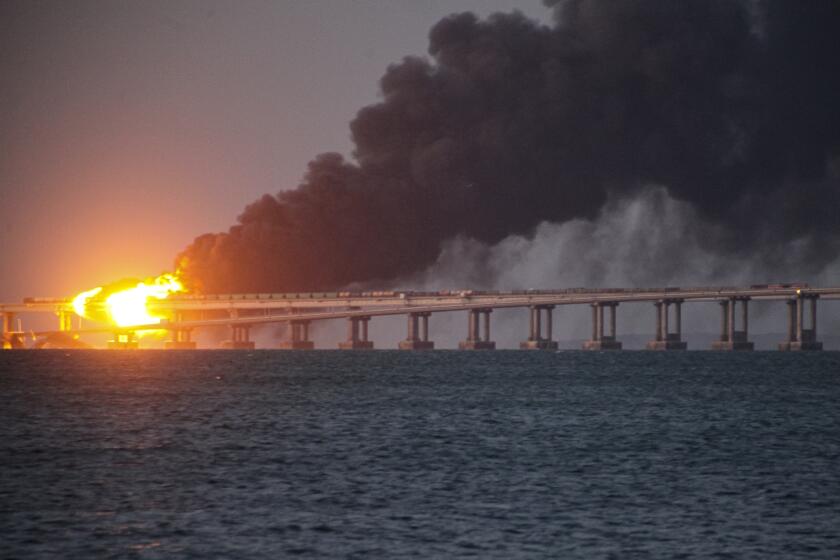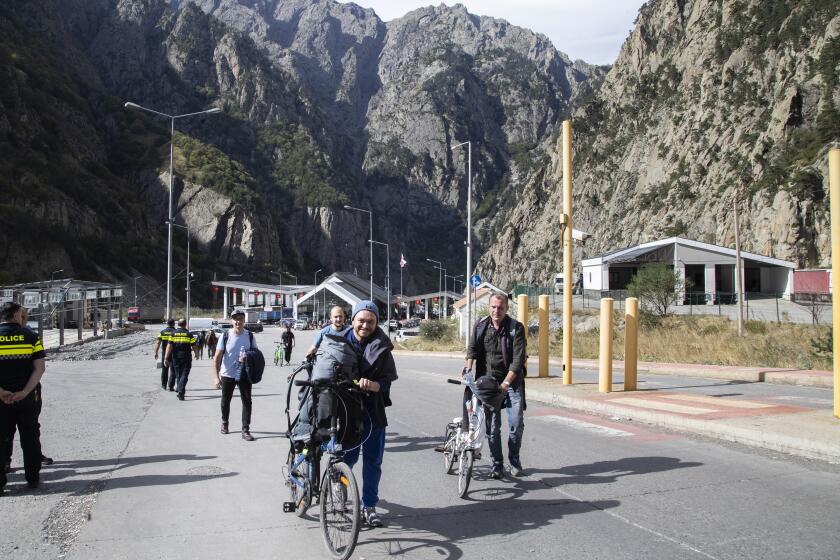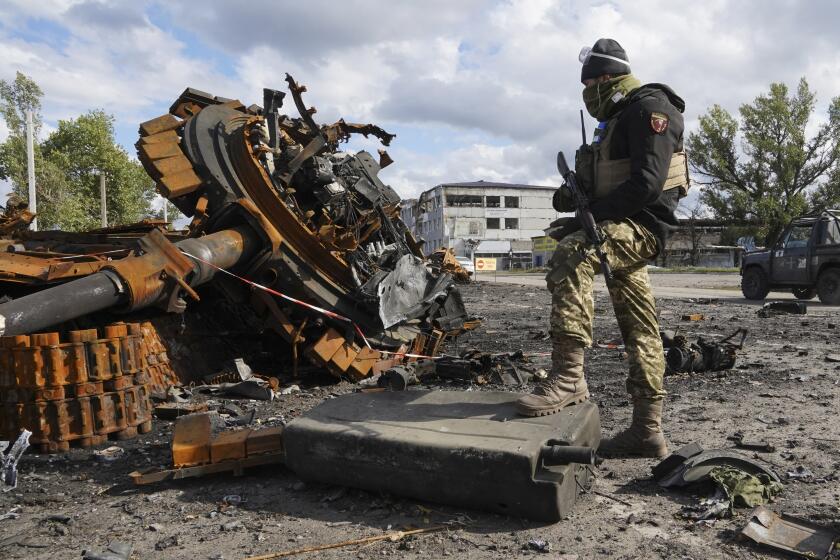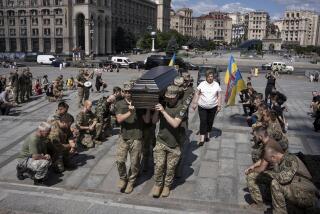West to bolster Ukraine air defense; nuclear plant suffers ‘blackout’
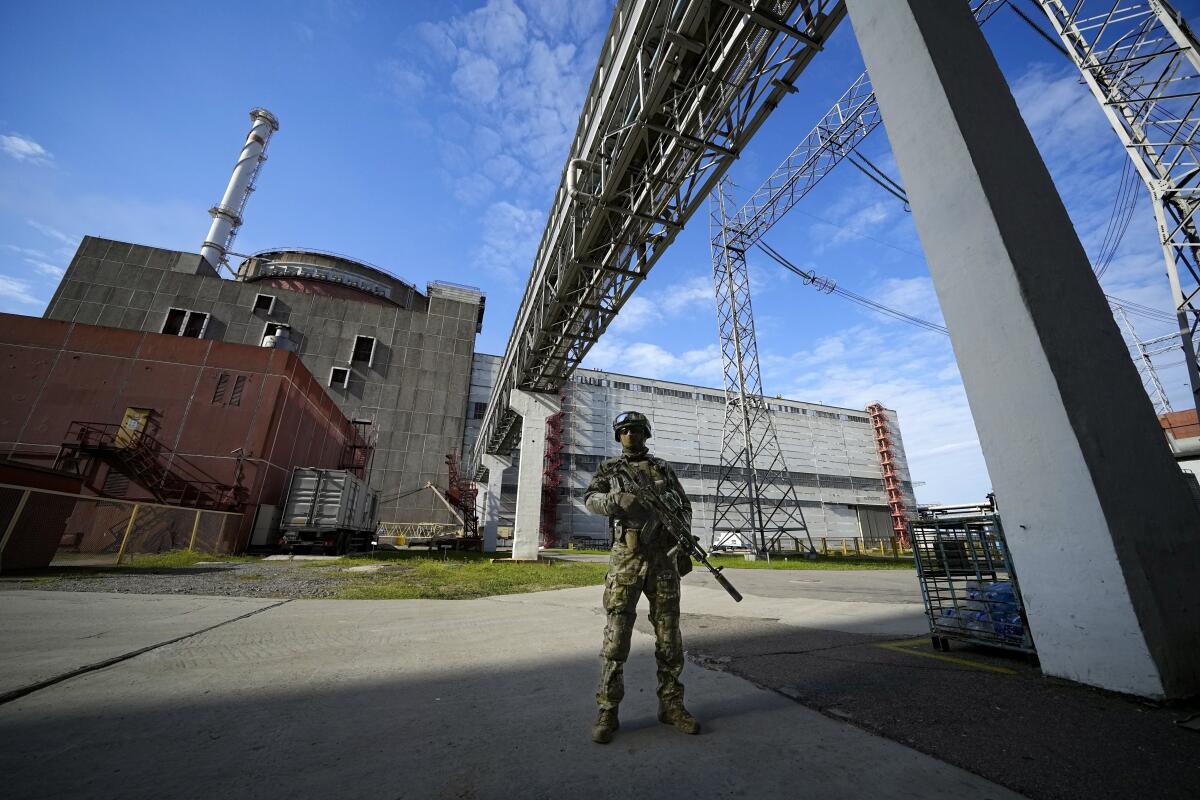
- Share via
KYIV, Ukraine — Unbowed Western powers pledged to supply Ukraine with more potent air defense systems following a furious barrage of retaliatory Russian missile strikes, including one that temporarily knocked Europe’s biggest nuclear plant off the invaded country’s electrical grid Wednesday.
The Russian-occupied Zaporizhzhia nuclear power plant suffered a “blackout” when a missile damaged a distant electrical substation, Ukraine’s state nuclear operator said. The power loss increased the risk of a radiation emergency because the plant needs electricity to prevent its reactors from overheating.
Energoatom said that the external power source was repaired after about eight hours and that the plant’s emergency diesel generators — which rely on uncertain fuel deliveries in the war zone — provided backup in the meantime, but a similarly hazardous interruption could happen at any time.
“Russia has seized the plant and is not taking any steps to de-escalate. On the contrary, it is shelling important infrastructure daily,” the company told the Associated Press.
Moscow’s barrage of missile strikes on cities across Ukraine has elicited celebratory comments from Russian officials and pro-Kremlin pundits.
Hundreds of cities and towns across Ukraine lost electricity after Russia launched a wide-ranging missile assault Monday in retaliation for a truck bombing that damaged a bridge linking Russia with Crimea, which Moscow illegally annexed in 2014.
With repairs to the grid still in progress, Ukraine’s prime minister asked people to reduce evening energy consumption by 25% and prepare for winter by keeping essentials such as warm clothes, candles, flashlights and batteries ready.
As the barrage that killed dozens of Ukrainians this week continued, Ukraine’s Western allies met at the North Atlantic Treaty Organization headquarters in Brussels to calibrate their response.
U.S. Gen. Mark A. Milley, chairman of the Joint Chiefs of Staff, said Ukraine wants its Western partners to provide it with a complete air defense system to contend with Russian warplanes and missiles. Milley spoke to reporters after a meeting of the Ukraine Defense Contact Group, about 50 nations that gather regularly to assess Kyiv’s needs and drum up equipment.
“What Ukraine is asking for, and what we think can be provided, is an integrated air missile defense system. So that doesn’t control all the airspace over Ukraine, but they’re designed to control priority targets,” Milley said.
In numbers comparable to the size of Putin’s 300,000-strong mobilization, Russian men are fleeing military call-up. Not everyone welcomes them.
Andriy Yermak, the head of Ukrainian President Volodymyr Zelensky’s office, said the meeting was “historic” because decisions to “close the sky” for Ukraine were being made there. Ukraine has put a priority on strengthening its air defenses, but NATO members have worried about how to do that without triggering a wider war in Europe.
Zelensky’s office said Moscow’s retaliatory strikes killed at least 14 people and wounded 34 over the last day in the Zaporizhzhia region and the Donetsk region to the east. At least 19 died in Monday’s onslaught, including five in Kyiv.
A day after Ukraine’s Defense Ministry announced the arrival of the first of Germany’s four promised IRIS-T air defense systems, the defense minister of the Netherlands said her country would deliver $14.5-million worth of air defense missiles in light of Russia’s latest attacks.
“These attacks reinforce the government’s belief that they can only be answered with unwavering support for Ukraine and its people,” Defense Minister Kajsa Ollongreher said. “The Netherlands, like our partners, will not be intimidated by Russia.”
French President Emmanuel Macron, in a television interview Wednesday evening, promised prompt delivery of more cannons and also antiaircraft systems and missiles.
The U.S. is expected to deliver two advanced NASAMS antiaircraft systems in the coming weeks.
The nuclear scare and pledges of more Western support came amid a flurry of developments in Russia’s 7½-month-old invasion.
As Russia’s military performance weakens, a notorious mercenary group, long part of the Ukraine fight, steps into spotlight.
Moscow’s main domestic security agency said it arrested eight people — five Russians and three citizens of Ukraine and Armenia — over the blast on the Kerch Bridge between Russia and Crimea. A truck loaded with explosives blew up while driving across the bridge Saturday, killing four people and causing sections of road to collapse, Russian officials said.
The span opened in 2018, four years after Russia illegally seized Crimea from Ukraine, serving as a symbol of Moscow’s regional dominance as well as a crucial route for military supplies for its troops in Ukraine and for Russians traveling to a popular vacation destination.
The Federal Security Service, known by the Russian-language acronym FSB, alleged that the detained suspects acted on orders of Ukraine’s military intelligence to secretly move the explosives into Russia using forged documents.
Ukrainian Defense Ministry spokesman Andriy Yusov denied the accusation that his country was involved, telling reporters, “The entire activity of the FSB and the Investigative Committee is nonsense.”
Zelensky’s office said in a morning update that strikes on central and western parts of Ukraine had ceased but Russian shelling and attacks involving drones, heavy artillery and missiles continued in eight southeast regions.
More than a dozen missiles were fired at the city of Zaporizhzhia and its suburbs, damaging residential buildings. Part of a larger eponymous region that Moscow has illegally annexed, the city remains in Ukrainian hands while Russian forces control the area where the nuclear plant is located.
In Nikopol, a city of 104,000 across the Dnieper River from the plant, three people were gravely wounded, including a 6-year-old girl. More than 30 multistory residential buildings were damaged, as well as private houses and schools, Ukrainian authorities said.
Breaking News
Get breaking news, investigations, analysis and more signature journalism from the Los Angeles Times in your inbox.
You may occasionally receive promotional content from the Los Angeles Times.
Rafael Mariano Grossi, the head of the U.N.’s International Atomic Energy Agency, said the loss of external power at the nuclear plant for the second time in five days again exposed “how precarious the situation is,” and he pleaded again for a security zone around the plant.
All six of the Zaporizhzhia reactors were stopped earlier because of the war. But they still require electricity to prevent them and their spent fuel rods from overheating to the point of a meltdown that could release radiation into the atmosphere of Ukraine and potentially other European countries, including Russia.
In the Donetsk region, Russian tanks shelled the city of Avdiivka, damaging residential buildings and a market. Seven people were killed and eight wounded, Kyrylo Tymoshenko, the deputy head of Zelensky’s office, said via Telegram, posting photos of bodies on the ground by a kiosk with potatoes and bread on the counter.
Before the bombardment of the last three days, Russian forces over the last month had lost ground to a Ukrainian counteroffensive in the east and south, drawing criticism from hawkish commentators in Russia.
Earlier Wednesday, Ukraine’s southern command said its forces recaptured five settlements in the Kherson region, on the western fringe of an arc of Russian-controlled territory in eastern and southern Ukraine.
Near the southern city of Mykolaiv, Ukrainian forces shot down nine Iranian Shahed-136 drones and destroyed eight Kalibr cruise missiles, the presidential office said.
Yuras Karmanau in Tallinn, Estonia, and Lorne Cook in Brussels contributed to this report.
More to Read
Sign up for Essential California
The most important California stories and recommendations in your inbox every morning.
You may occasionally receive promotional content from the Los Angeles Times.
